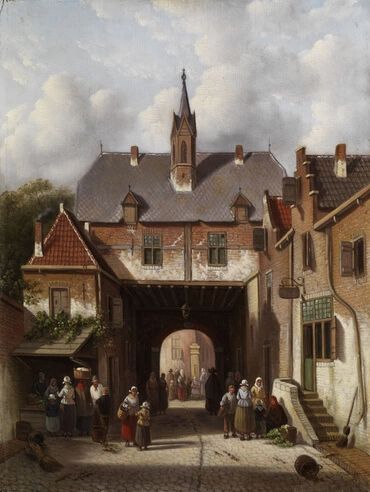Gate

Gates" in ancient times had a significance that does not hold in the modern world. Cities then were enclosed by walls for protection; gates in the walls let people in and out to do their business, but were also the weak points in the cities' defenses. In the Bible, cities on one level represent the minds of individual people. On a broader level, they represent beliefs shared by a community. The gates, then, represent openings where the Lord can feed us an understanding of truth and a desire for good. They also represent points where the hells can invade and sway us with false ideas and evil desires. We are kept in balance during our lifetimes, with influences from both the Lord and from hell. Ideally, we will over our lifetimes continue to invite the Lord farther and farther in and drive the hells back until ultimately the Lord can occupy our minds completely. And that point our belief in Him and His power and love will hold the gates and deny evil any entrance. As individuals, we at that point become angels. As communities, we at that point become part of the Lord's church. And at that point the gates become an entry point, introductory truths that allow people to enter churches and start bringing the Lord into their lives.
Arcanos Celestes # 909
909. Que a 'ave' signifique as sus coisas intelectuais e a 'besta' as suas voluntárias, que pertencem ao homem interno, e que 'todo réptil que rasteja sobre a terra' signifique as coisas correspondentes em seu homem externo, pode-se ver pela significação de 'ave', de que se tratou anteriormente, 40, 776, e de 'besta', de que se tratou nos 45-46, 142-143, 146. Que o 'réptil que rasteja sobre a terra' signifique as coisas correspondentes no homem externo vê-se daí, pois aqui o 'réptil que rasteja' se refere tanto à ave, ou as coisas intelectuais, quanto à besta, ou as voluntárias. Os antiquíssimos chamavam as coisas sensuais e as volúpias do corpo de 'répteis que rastejam', porque não são diferentes dos répteis que rastejam sobre a terra. E também assemelhavam o corpo do homem à terra ou ao húmus, e até o chamavam terra ou húmus, como aqui, onde pela 'terra' não é significada outra coisa senão o homem externo.






